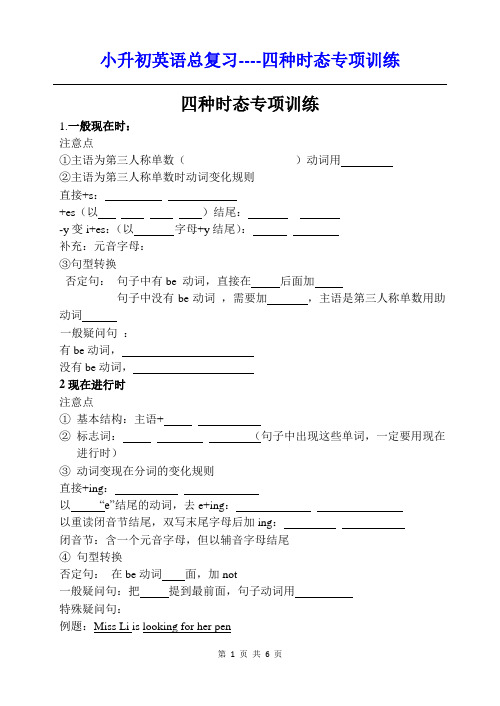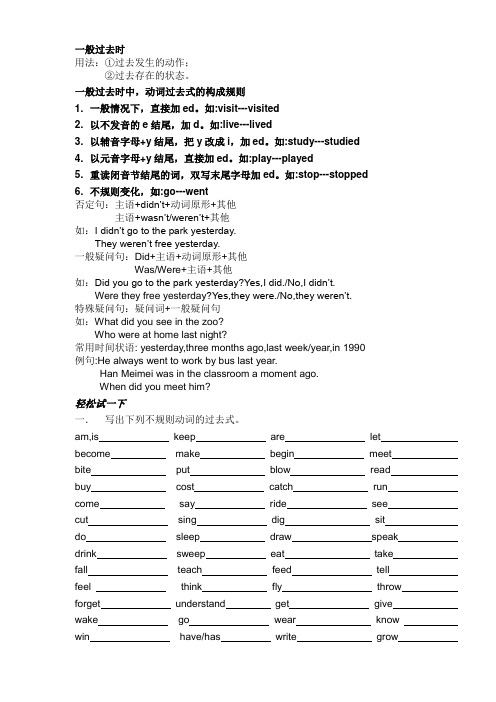小升初四种时态模拟题
小升初英语时态练习题50题(答案解析)

小升初英语时态练习题50题(答案解析)1. My mother often ______ (cook) delicious food for us.A. cookB. cooksC. cookingD. cooked答案解析:B。
在一般现在时中,当主语是第三人称单数( 如my mother)时,动词要用第三人称单数形式。
选项A是动词原形,不符合语法规则;选项C是现在分词形式,不能直接作谓语;选项D是过去式,这里描述的是经常发生的事情,不是过去时态,所以正确答案是B。
2. Tom and Jerry ______ (be) good friends.A. amB. isC. areD. be答案解析:C。
在一般现在时中,当主语是复数(Tom和Jerry是两个人,为复数概念)时,be动词要用are。
选项A“am”用于第一人称单数I;选项B“is”用于第三人称单数;选项D“be”是动词原形,不能直接作谓语,所以正确答案是C。
3. He ______ (go) to school by bike every day.A. goB. goesC. goingD. gone答案解析:B。
一般现在时中,主语he是第三人称单数,动词go 要变为goes。
选项A是动词原形,不符合要求;选项C是现在分词形式,不能单独作谓语;选项D是过去分词,这里不是过去时态,所以正确答案是B。
4. We ______ (have) English classes on Mondays.A. haveB. hasC. havingD. had答案解析:A。
一般现在时中,主语we是第一人称复数,动词用原形。
选项B“has”是第三人称单数形式的动词;选项C“having”是现在分词形式,不能作谓语;选项D“had”是过去式,这里是一般现在时,所以正确答案是A。
5. She ______ (like) reading books in the library.A. likeB. likesC. likedD. liking答案解析:B。
四种基本时态练习题

27.1 ate some delicious food.(改成一般疑问句)
________ ________ ________ __________ delicious food?
28.I flew a kite.(改否定句) I ________ ________ a kite.
标志性词汇:__________________________________________________
一.根据上下文用所给的单词正确形式填空:
(一)1. I usually _____________(play) sports after school.
2. He often ____________(help) me with my study.
6. Listen, The girls ______________(sing) in the next room.
7. Next week we ______________(go) toZhongshanPark.
8. My classmates sometimes _____________(go) tothe nature park together.
构成:________________________________________________________
________________________________________________________
标志性词汇:__________________________________________________
2. Where ________(be) your friends yesterday?
(完整版)小升初英语总复习----四种时态专项训练(精编)

四种时态专项训练1.一般现在时:注意点①主语为第三人称单数()动词用②主语为第三人称单数时动词变化规则直接+s:+es(以)结尾:-y变i+es:(以字母+y结尾):补充:元音字母:③句型转换否定句:句子中有be 动词,直接在后面加句子中没有be动词,需要加,主语是第三人称单数用助动词一般疑问句:有be动词,没有be动词,2现在进行时注意点①基本结构:主语+②标志词:(句子中出现这些单词,一定要用现在进行时)③动词变现在分词的变化规则直接+ing:以“e”结尾的动词,去e+ing:以重读闭音节结尾,双写末尾字母后加ing:闭音节:含一个元音字母,但以辅音字母结尾④句型转换否定句:在be动词面,加not一般疑问句:把提到最前面,句子动词用特殊疑问句:例题:Miss Li is looking for her pen①②对①进行提问:对②进行提问:3一般过去时:注意点④句型转换否定句:主语+ (没有be动词)主语+ (有be动词)一般疑问句:以开头(没有be动词)以开头(有be动词)特殊疑问句:特殊疑问词+ + + ?(没有be动词)例题翻译:你家过去在哪里?4,一般将来时注意点①基本结构:主语+②标志词:next+年,月,日③句型转换:否定句:在be动词面加not他下周打算去公园吗?(一般疑问句)他下周打算去哪里?(特殊疑问句)④翻译:下周它将会是:_________ did you ________ the birds?2. Then, he let the boy go.(改为否定句)Then,he _______ ________ the boy go.3. They could play football.(改为一般疑问句,并作肯定回答)----________ they play football? ----Yes, they _________.4. Nancy lives in Nanjing now.(用last year 改写句子)Nancy _______ in Nanjing last year.5.I went to a shopping centre last Sunday.(改为一般疑问句,并作否定回答)---______ you ______ to a shopping centre last Sunday? ---No, I _________.6. He puts his things in order. (改为一般疑问句)___________________________________________________7. Did you go to bed late last night? (改为陈述句)____________________________________________________8. They often do their homework in the evening. (用she替换they)____________________________________________________9. You should put your books and toys on the floor. (改为否定句)_____________________________________________________10. He feels sleepy in the morning. (对划线部分提问)____________________________________________________11. This is Bobby’s bedroom. (对划线部分提问)____________________________________________________12. have, my, time, breakfast, I, always, on (.) (连词成句)____________________________________________________.13. The, out, the, get, lion, mouse, helped (.) (连词成句)____________________________________________________. 14. A monkey woke the tiger up.(改成一般疑问句)__________________________________________________15. Sam brings some water.(改成否定句)__________________________________________________16. Mike has some bread and milk for breakfast. (对划线部分提问)__________________________________________________17. The man sings well. (对划线部分提问)18. too, you, cola, much, drink, shouldn’t (.) (连词成句)______________________________________________________20 The children must play football on the road.(改为否定句)______________________________________________________ 21. We must look out for the traffic lights first.(对划线部分提问)______________________________________________________ 22. An old woman is crossing the road.(对划线部分提问)______________________________________________________ 23. You can’t watch TV now because it’s late. (对划线部分提问)______________________________________________________ 24. keep, desk, tidy, I, must, my, clean, and (.)(连词成句)______________________________________________________二用所给词的适当形式填空1.Let (we )(play) basketball this afternoon.2. (Be)your sister (visit) your parents tomorrow?3.Yang Ling is going to (make) clothes for her dolls.4. (child) Day is on the first of June.5. Tim usually (brush) his teeth in the morning.6.I (have) a birthday party last year.7.Tomorrow is Dragon Boat Festival. We (watch )a dragon boat race.8. They (eat) moon cakes last Mid-Autumn Festival?9.My parents ( watch) TV in the living room now.10. Your birthdayis coming. I (make) a cake for you.11.Let’s(play) the piano together.12.How many ( visit) are there in your group?13.My sister wants ( learn) about in England.14.My uncle is from ( Chinese).15.Animal ( love) will go to see them quickly.16.Jack (go )and look for his parents next week.17. (visit) from the US are very friendly.18.The girls ( learn) an English song next week.19.The students are very (excite).Because the game is very (e xcite).20.My mother likes ( listen)to music after dinner.21.He ( read) a book last night.22.Lucy is going to ( find) a book about e- cards.23.I (eat) some bread for breakfast yesterday.24.Can I ( have) an English book?25.We (are) twelve years old last year.26.I want (buy )a computer.27.What ( be) your parents going to do this weekend?28.We (fly) kites tomorrow.29.The boy ( come) to my house the day after tomorrow.30.What about (go )for a picnic next week?31. Mary’s birthday is next Monday, her mother (give) her a present.32.My mother ( buy) some snacks and drinks this morning.33. (Be) your family going to climb the hill next Sunday?34.Now, Bobby ( wear) his new clothes.35.This lesson (end) at half past eleven. Then you can have lunch.35. It is very cold these days . It (snow) tomorrow.36.-- You ( come here again next Saturday?---No. I (visit) my teacher.37.Hurry up! or we (be )late.38.--What you ( do) tomorrow afternoon?--I (see )a film with my friend.39.---Can you come and ( help )me with my English ,mum?。
小升初四种时态模拟题-共9页

一般过去时用法:①过去发生的动作;②过去存在的状态。
一般过去时中,动词过去式的构成规则1. 一般情况下,直接加ed。
如:visit---visited2. 以不发音的e结尾,加d。
如:live---lived3. 以辅音字母+y结尾,把y改成i,加ed。
如:study---studied4. 以元音字母+y结尾,直接加ed。
如:play---played5. 重读闭音节结尾的词,双写末尾字母加ed。
如:stop---stopped6. 不规则变化,如:go---went否定句:主语+didn’t+动词原形+其他主语+wasn’t/weren’t+其他如:I didn’t go to the park yesterday.They weren’t free yesterday.一般疑问句:Did+主语+动词原形+其他Was/Were+主语+其他如:Did you go to the park yesterday?Yes,I did./No,I didn’t.Were they free yesterda y?Yes,they were./No,they weren’t.特殊疑问句:疑问词+一般疑问句如:What did you see in the zoo?Who were at home last night?常用时间状语: yesterday,three months ago,last week/year,in 1990例句:He always went to work by bus last year.Han Meimei was in the classroom a moment ago.When did you meet him?轻松试一下一.写出下列不规则动词的过去式。
am,is keep are let become make begin meet bite put blow read buy cost catch run come say ride see cut sing dig sitdo sleep draw speak drink sweep eat take fall teach feed tell feel think fly throw forget understand get give wake go wear know win have/has write grow二.用动词的适当形式填空。
小升初英语动词时态变化练习题50题带答案

小升初英语动词时态变化练习题50题带答案1.I _____ to school every day.A.goB.goesC.wentD.going答案解析:A。
本题考查一般现在时。
选项A“go”是动词原形,用于一般现在时主语是第一人称、第二人称和第三人称复数的情况。
句子中的主语是“I”,所以用“go”。
选项B“goes”是动词第三人称单数形式,用于主语是第三人称单数时。
选项C“went”是过去式,不符合本题时态。
选项D“going”不能单独作谓语。
一般现在时表示经常发生的动作或存在的状态,标志词有often、usually、always 等。
2.She _____ breakfast at seven.A.haveB.hasC.hadD.having答案解析:B。
本题考查一般现在时第三人称单数形式。
选项B“has”是动词“have”的第三人称单数形式,句子主语“She”是第三人称单数,所以用“has”。
选项A“have”用于第一人称、第二人称和第三人称复数。
选项C“had”是过去式。
选项D“having”不能单独作谓语。
一般现在时表示经常发生的动作或存在的状态,标志词有often、usually、always 等。
3.We _____ our homework in the evening.A.doB.doesC.didD.doing答案解析:A。
本题考查一般现在时。
选项A“do”是动词原形,用于一般现在时主语是第一人称、第二人称和第三人称复数的情况。
句子中的主语是“We”,所以用“do”。
选项B“does”是动词第三人称单数形式。
选项C“did”是过去式。
选项D“doing”不能单独作谓语。
一般现在时表示经常发生的动作或存在的状态,标志词有often、usually、always 等。
4.He _____ football on Sundays.A.playB.playsC.playedD.playing答案解析:B。
小升初英语一般现在时一般过去时现在进行时综合单选题50题

小升初英语一般现在时、一般过去时、现在进行时综合单选题50题1. I ______ my homework every day.A. doB. doesC. didD. doing答案:A。
本题考查一般现在时,主语是I,不是第三人称单数,所以用动词原形do。
B 选项does 用于第三人称单数主语;C 选项did 是一般过去时;D 选项doing 是现在分词,不能直接作谓语。
2. My sister often ______ TV in the evening.A. watchB. watchesC. watchedD. watching答案:B。
主语My sister 是第三人称单数,一般现在时中动词要加s 或es,watch 变为watches。
A 选项watch 用于主语不是第三人称单数的情况;C 选项watched 是一般过去时;D 选项watching 是现在分词,不能单独作谓语。
3. We ______ to school on foot.A. goB. goesC. wentD. going答案:A。
We 是复数主语,一般现在时用动词原形go。
B 选项goes 用于第三人称单数主语;C 选项went 是一般过去时;D 选项going 是现在分词,不能直接作谓语。
4. My father ______ newspapers every morning.A. readB. readsC. readingD. readed答案:B。
My father 是第三人称单数,一般现在时动词加s,read 变为reads。
A 选项read 用于主语不是第三人称单数或过去时;C 选项reading 是现在分词,不能单独作谓语;D 选项readed 形式错误,read 的过去式还是read。
5. They ______ basketball after school.A. playB. playsC. playedD. playing答案:A。
小升初英语时态练习题
小升初英语时态练习题在小升初的英语学习中,掌握时态是非常重要的。
以下是一些英语时态的练习题,帮助学生巩固和练习不同的时态。
一、一般现在时1. 用一般现在时填空:- I _________ (go) to school by bus every day.- She _________ (have) lunch at twelve o'clock.2. 改写下列句子为一般现在时:- He is going to the park. (He goes to the park.)二、一般过去时1. 用一般过去时填空:- They _________ (visit) the museum last Sunday.- She _________ (do) her homework yesterday evening.2. 改写下列句子为一般过去时:- She is reading a book. (She read a book.)三、一般将来时1. 用一般将来时填空:- We _________ (have) a party next weekend.- He _________ (start) a new job next month.2. 改写下列句子为一般将来时:- They are going to the beach. (They will go to the beach.)四、现在进行时1. 用现在进行时填空:- What _________ you _________ (do) right now?- My mother _________ (cook) dinner.2. 改写下列句子为现在进行时:- She is going to the store. (She is going to the store.)五、过去进行时1. 用过去进行时填空:- What _________ he _________ (do) at this time yesterday? - They _________ (play) football when it started to rain.2. 改写下列句子为过去进行时:- She was going to the library. (She was going to the library.)六、现在完成时1. 用现在完成时填空:- I _________ (read) three books this week.- They _________ (finish) their project.2. 改写下列句子为现在完成时:- She has been to Paris. (She has been to Paris.)七、过去完成时1. 用过去完成时填空:- By the time we arrived, the movie _________ (start).- She _________ (study) for two hours before the exam.2. 改写下列句子为过去完成时:- He had finished his homework. (He had finished his homework.)八、将来完成时1. 用将来完成时填空:- By the end of this year, I _________ (learn) a new language.- They _________ (build) the new bridge by next summer.2. 改写下列句子为将来完成时:- They will have finished the project. (They will have finished the project.)请同学们认真完成这些练习题,以加深对英语时态的理解和应用能力。
小升初英语一般将来时、现在进行时与一般现在时混合练习题20题(带答案)
小升初英语一般将来时、现在进行时与一般现在时混合练习题20题(带答案)1. My mother ______ some cakes for us this afternoon.A. makesB. is makingC. will make答案解析:C。
一般将来时表示将来某个时间要发生的动作或存在的状态。
句中有this afternoon(今天下午)这个表示将来的时间状语,所以要用一般将来时,will make符合要求。
选项A makes是一般现在时,通常表示经常或习惯性的动作,在这里不符合语境。
选项B is making是现在进行时,强调正在进行的动作,与this afternoon不搭配。
2. Look! The boys ______ football on the playground.A. playB. are playingC. will play答案解析:B。
现在进行时表示正在进行的动作或存在的状态。
句中的Look( 看)表明动作正在发生,所以要用现在进行时,are playing 符合要求。
选项A play是一般现在时,不能体现动作正在进行。
选项C will play是一般将来时,与Look所表示的现在正在进行的语境不符。
3. He usually ______ to school by bike, but tomorrow he ______ abus.A. goes; will takeB. go; takesC. is going; is taking答案解析:A。
第一空,usually( 通常)是一般现在时的标志词,主语He是第三人称单数,所以动词用goes。
第二空,tomorrow(明天)是一般将来时的标志词,所以要用will take。
选项B中go形式错误,takes也不符合tomorrow的语境。
选项C中is going和is taking 都是现在进行时表将来,但在这里一般将来时更合适。
小升初英语时态练习题40题
小升初英语时态练习题40题1.She _____ to school by bus every day.A.goB.goesC.goingD.went答案:B。
“every day”表明是一般现在时,主语是she,谓语动词要用第三人称单数形式goes。
选项A go 是原形,主语不是第三人称单数时使用;选项C going 是现在分词,不能单独作谓语;选项 D went 是过去式,不符合一般现在时的要求。
2.We _____ our homework in the evening.A.doB.doesC.doingD.did答案:A。
“we”是复数主语,一般现在时谓语动词用原形do。
选项B does 是第三人称单数形式;选项C doing 是现在分词,不能单独作谓语;选项D did 是过去式,不符合一般现在时要求。
3.Mary _____ singing very much.A.likeB.likesC.likingD.liked答案:B。
主语Mary 是第三人称单数,一般现在时谓语动词用likes。
选项A like 是原形,主语不是第三人称单数时使用;选项C liking 是现在分词,不能单独作谓语;选项D liked 是过去式,不符合一般现在时要求。
4.My father _____ to work by car.A.goB.goesC.goingD.went答案:B。
“my father”是第三人称单数,一般现在时谓语动词用goes。
选项A go 是原形,主语不是第三人称单数时使用;选项C going 是现在分词,不能单独作谓语;选项D went 是过去式,不符合一般现在时要求。
5.They _____ football on the playground after school.A.playB.playsC.playingD.played答案:A。
“they”是复数主语,一般现在时谓语动词用原形play。
小升初英语各大时态练习题
单击此处添加副标题内容
汇报人:XX
目录
CONTENTS
01 单击此处添加文本 02 一般现在时态 03 现在进行时态 04 一般过去时态 05 一般将来时态
xx
PART ONE
添加章节标题
xx
PART TWO
一般现在时态
定义与用法
单击此处添加标题
定义:一般现在时态表示经常发生的动作或存在的状态
练习题
写出下列句子中的现在分词形式:I am writing a letter.
写出下列句子中的否定形式:We are studying English.
添加标题
添加标题
将下列句子改为一般疑问句:He is playing the guitar.
添加标题
添加标题
将下列句子改为现在进行时的否定 句:They are running in the park.
定义与用法
定义:表示现在或现阶段正在 进行或发生的动作或状态
用法:常与now、right now、 at the moment等时间状语连 用,表示正在进行的动作
结构:be动词+动词ing形式, 例如“I am studying English right now”
注意事项:与一般现在时态的 区别和易混淆点
选择正确形式填空:He _______ (not) like bananas.
用括号中所给单词的适当形式填 空:I _______ (go) to school every day.
根据句子意思及所给提示,写 出正确的单词形式:What _______ (do) your father do?
答案解析
答案解析
- 1、下载文档前请自行甄别文档内容的完整性,平台不提供额外的编辑、内容补充、找答案等附加服务。
- 2、"仅部分预览"的文档,不可在线预览部分如存在完整性等问题,可反馈申请退款(可完整预览的文档不适用该条件!)。
- 3、如文档侵犯您的权益,请联系客服反馈,我们会尽快为您处理(人工客服工作时间:9:00-18:30)。
一般过去时用法:①过去发生的动作;②过去存在的状态。
一般过去时中,动词过去式的构成规则1.一般情况下,直接加ed。
如:visit---visited2.以不发音的e结尾,加d。
如:live---lived3.以辅音字母+y结尾,把y改成i,加ed。
如:study---studied4.以元音字母+y结尾,直接加ed。
如:play---played5.重读闭音节结尾的词,双写末尾字母加ed。
如:stop---stopped6.不规则变化,如:go---went否定句:主语+didn’t+动词原形+其他主语+wasn’t/weren’t+其他如:I didn’t go to the park yesterday.They weren’t free yesterday.一般疑问句:Did+主语+动词原形+其他Was/Were+主语+其他如:Did you go to the park yesterday?Yes,I did./No,I didn’t.Were they free yesterda y?Yes,they were./No,they weren’t.特殊疑问句:疑问词+一般疑问句如:What did you see in the zoo?Who were at home last night?常用时间状语: yesterday,three months ago,last week/year,in 1990例句:He always went to work by bus last year.Han Meimei was in the classroom a moment ago.When did you meet him?轻松试一下一.写出下列不规则动词的过去式。
am,is keep are let become make begin meetbite put blow readbuy cost catch runcome say ride seecut sing dig sit do sleep draw speakdrink sweep eat take fall teach feed tell feel think fly throw forget understand get give wake go wear knowwin have/has write grow 二.用动词的适当形式填空。
(be)my birthday last Friday.Mike (play)computer games yesterday?---No,he .He (go)to see a film.(tell)me not to come too near the snake last time.(milk)a cow last Friday.Saturday my mother(go)shopping and (buy)me a skirt.likes newspapers,but she a book yesterday.(read)mother (plant)a tree last year.8. they (sweep) the floor last Friday?No,they .(not watch)a cartoon yesterday.(not)go to school (go)to the park.’s father (give)him a present for his birthday.12. they (visit)the museum last Sunday.(teach)you English last year?---Mr Chen (do).(draw)many pictures yesterday.football now,but he baskteball an hour ago.(play)your brother (get)here?---He (get)here 5 days ago.all (have)a good time yesterday.you (begin)to learn English?---I (begin)to learn English 5 years ago.19. you (have)a dog before?father (not stay)at home (go)to Guangzhou.(run)fastest on last Sports Day.22. (be)you tall 3 years ago?(be not)at home an hour ago,I (be)at school.you (take)these photos?---I (take)them last month.(feed)the dog yesterday?三.选词填空。
Last year I 1 some apple seeds in a 2 them every shoots 3 soonThe young trees 4 very I 5 the young apple trees in my garden in front of my house. Yesterday the strong wind 6 .Some of my apple trees 7 broken. This morning I 8 to save the broken hope the trees will grow better.putting putblowing一般现在时用法:①现阶段经常性、习惯性动作,常与表示频度的时间状语连用。
时间状语:often,always,sometimes,usually,never,every day,every year,on Sundays,twice a year如:I leave home for school at 7 every morning.②目前的状态;如:Guangzhou is 2313 kilometres away from Beijing.③客观真理;如:The earth moves around the sun.Shanghai lies in the east of China.④在时间状语从句或条件状语从句中,一般现在时代替一般将来时。
(主将从现)如:I'll help you as soon as you have problem构成:主语是第三人称单数时,作谓语的行为动词要加词尾-s(-es),其他人称和数用动词原形。
一般现在时中第三人称单数作主语时,谓语动词的变化规则:1.一般情况下,直接加s。
如:get---gets2.以o、sh、ch结尾的动词,加es。
如:do---does3.辅音字母加y结尾,改y为i,加es。
如:study---studies4.元音字母加y结尾,直接加s。
如:enjoy---enjoys否定句:I/you/we/they/he/she+do not+动词原形===I don’t/you don’t/we don’t/they don’t+动词原形he/she/it+does not+动词原形===he doesn’t/she doesn’t/it doesn’t+动词原形如:He doesn’t practise English every morning.I don’t enjoy playing badminton in winter.疑问句中:须将助动词Do/Does提前到句首,其余不变例:Do you work as accountant in London?Does she go to the cinema on weekends?轻松练一下一.写出下列动词在第三人称单数时的正确形式。
do go wash catchswim have make wishstudy play move write二.用动词所给的适当形式填空。
mother (work)in a primary school.parents (not work)in Guangzhou.(be)some milk in the bottle.and I (take)a walk together every morning.aunt (look)after her baby carefully.(be) can (carry)the heavy box.7.Nancy (go)to school on foot every day.(not watch)TV on weekdays.9. your parents (read)newspapers every day?(study)hardest in your class?teacher (be)always busy.(have)a toy plane and Ben (have)a toy bike.he (do)every evening?(be)an athlete.often (have)dinner at school.and Tommy (be)in Class One.often (play)chess with her friends.(not go)to the zoo on Sundays.19. they (like)hamburgers?sister (be)a (study)very hard.mother often (go)shopping and (buy)some vegetables in the market.(like)cooking.always (finish)my homework before 8:00.(have)a big house.mother is a (teach)English in a middle school.(do)not like English.(cook)breakfast for you everyday?三.按要求转换句子,每空一词。
likes playing chess with his friends.(改为否定句)Tom playing chess with his friends.’s parents often go for a walk in the evening.(改为一般疑问句并作出否定回答)Janet’s parents often a walk after supper?-No, .usually watches TV.(改成一般疑问句)he usually ?has some red shirts and green scarves.(变成否定句)She any red shikts and green scarves.现在进行时中,现在分词构成规则:1.一般情况下,直接加ing。
